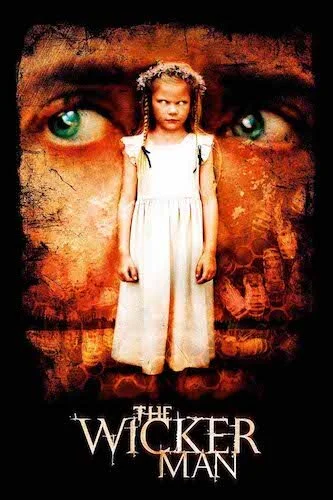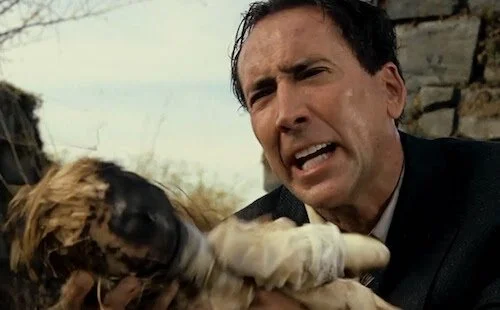The Wicker Man (2006): 31 Days of Horror
For all of October, we will review horror films. Submit your requests here, and you may see your picks selected!
The original Wicker Man is okay. Just okay. It has a great eeriness around it that unleashes in climactic proportions. It’s an important entry in the pagan horror film category. Still, it’s just okay, which is a lot more than I can say about the 2006 remake by Neil LaBute. Easily one of the greatest ironic watches of the twenty first century, this Wicker Man is so bad — and I do mean so bad — that it only makes sense to watch it as the film it wasn’t meant to be. Honestly, sit down and try to be scared by this picture. Unlike the brooding pandemonium of the original that feels like an entire community is brainwashed, this remake feels like everyone is looney. There’s a big difference between the two: you take the former more seriously. It’s virtually impossible to watch 2006’s The Wicker Man with a straight face.
As the anchor of a film where everyone else is bonkers and the lead is meant to be the voice of reason, we have Nicolas Cage. That casting decision alone is entirely non-sensical, as Cage’s Edward Malus (a cop doing an investigation) is missing a few screws from the very beginning of this thing. It’s not like he slowly becomes crazy along with the inhabitants of whatever island he’s on. He’s slightly off before anything even happens, which is rather quickly by the way. The key to films like this is that audiences have to be eased into states of delirium or absurd predicaments. Being “off” right away doesn’t work, and it especially fails when you have overacting, atrocious dialogue, and a plot that virtually no one who is paying attention cares about (not amidst all of the accidental fun, anyway).
To this day, no one has figured out how the doll got burned.
In any other film of this nature — say Midsommar, if not the original Wicker Man — you watch and feel more and more sick with each progression towards the truth of a society. Here, each sequence feels like the next joke in a comedy lineup. Cage yells, everyone else underacts, and none of these clues really feel like they’re adding up outside of proving that “this is weird”, which we already know. Above all of that, so many of these strange moments are either completely useless (Cage screaming about how a doll got burned, which could have been resolved far more quickly and less pathetically) or make zero sense as to how they add to the story (Cage “saving the day” by ripping masks off of children who are playing, only to then leave, making zero difference in the lives of all involved).
What is especially fascinating to the point of being uproarious with any audience is how The Wicker Man is clearly meant to be frightening. What I don’t understand is how. How is Nicolas Cage dressed up in a bear costume knocking someone out meant to be enticing or add to the anxiety of the film? How do the townspeople, who are only beyond irritating, create any sort of actual genuine fear? Is Nicolas Cage belting out his infamous “Not the bees!” like while bees are poured onto his face even remotely scary, and if so, is that sensation able to outweigh how funny it is? The Wicker Man feels like opposite day, where this is the exact opposite of everything it should have been. I’ve got to say I like it: not the film that Neil LaBute and company set out to make, but the disastrous end result which is beyond description. Have you ever asked a fast food restaurant for something in the drive through (like a hamburger meal), and you have no idea how they messed up your request this badly (you receive a bag of gummy worms coated in cinnamon)? That’s 2006’s The Wicker Man: it misses the mark so badly, it hit a completely different target right in the middle.
Andreas Babiolakis has a Masters degree in Film and Photography Preservation and Collections Management from Ryerson University, as well as a Bachelors degree in Cinema Studies from York University. His favourite times of year are the Criterion Collection flash sales and the annual Toronto International Film Festival.






